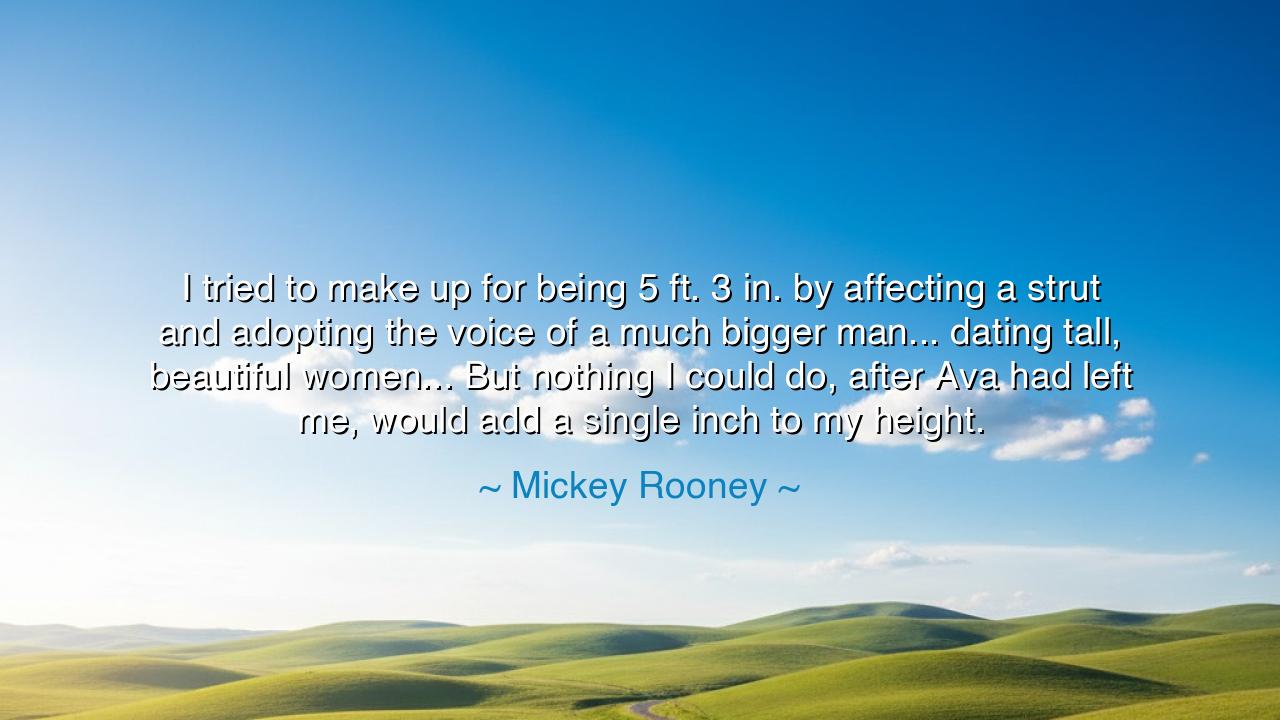
I tried to make up for being 5 ft. 3 in. by affecting a strut and
I tried to make up for being 5 ft. 3 in. by affecting a strut and adopting the voice of a much bigger man... dating tall, beautiful women... But nothing I could do, after Ava had left me, would add a single inch to my height.






In the ledger of longing and loss, a small man writes a tall truth: “I tried to make up for being 5 ft. 3 in. by affecting a strut and adopting the voice of a much bigger man… dating tall, beautiful women… But nothing I could do, after Ava had left me, would add a single inch to my height.” In these words, Mickey Rooney lays bare the ancient ache to enlarge the self by costume and conquest. He names the pageant we all know: the attempt to stitch external grandeur onto an inward uncertainty, to stack borrowed inches atop a soul afraid to stand as it is.
Mark how the confession moves: first the posture—the exaggerated strut—then the performance—the deeper voice—then the trophies—dating women whose tall grace might cast a longer shadow. Each is a garment worn against the chill of inadequacy. Yet the heart learns what the tailor will not say: fabric cannot make a stature; applause cannot mend a fracture. And so the line ends in surrender: after Ava—love exalted, love lost—no script or stride would add a single inch to the measure that truly mattered.
Here, the meaning sharpens. The quote is not about inches but essence. It teaches that compensation without conversion is theater; that we may decorate our insecurity without ever healing it. The “bigger man” voice is a bell without a clapper if the ring of truth is missing. The strut becomes a parade around an unvisited wound. Even the prize of beautiful women—won to outshout the world’s measuring rod—cannot quiet the ruler in the mind. When affection departs—when Ava left me—the scaffolding shakes, and the unbuilt house is revealed.
Consider a kindred story. The Roman general Julius Caesar, mocked in youth for a narrow purse and a kidnapped humiliation, spent years conquering as if empire could silence memory. He returned from Gaul with laurels tall as towers, yet he wept before a statue of Alexander, lamenting how little he had achieved by the same age. The world said, “How vast!”; his heart answered, “Not enough.” Like Rooney’s inches, Caesar’s miles could not lengthen the measure that tormented him. The lesson is old: external victories do not repair internal verdicts.
Another tale, quieter, shows the other way. Abraham Lincoln, haunted by melancholy, could not alter his lank and awkward frame—or the losses that carved his face—but he turned from masking to meaning. He did not strut; he stooped to listen. He did not adopt the voice of a bigger man; he grew a voice weighty with mercy. His stature rose because his center deepened. In him we see how acceptance does not shrink a life; it roots it, and rooted things rise.
What, then, shall we learn? First, that image-work without soul-work is a ladder propped against fog. Second, that love, however dazzling—your Ava, whoever she is—cannot confer height upon a self you refuse to stand inside. Third, that the measurements we chase (beauty, status, conquest) are poor carpenters of dignity. The true increment is inward: integrity, repentance, craftsmanship, service. These do not add a single inch to the body; they enlarge the person until rulers look foolish beside them.
Let actions follow—simple, steel-true. Name the wound you’ve been costuming; write it in plain words and refuse euphemism. Trade the strut for steady steps: daily practices that build character (keep a promise, finish a page, call the one who is hard to love). Replace the borrowed voice with the honest one: speak less, say true, apologize swiftly. In dating, seek not height to wear like a medal but a soul to honor like a vow. And when loss comes—as it did when Ava left—do not sprint to the mirror. Sit with the grief until it tutors you; let it teach you the only growth that matters.
In time you may discover this paradox: acceptance is a strange alchemy. It does not lengthen the body, but it lifts the bearing. It does not gild the mask, but it grants a face. And though you remain 5 ft. 3 in., you will walk with the quiet stature of one who no longer begs inches from the world. Then your life, unstrutted and unforced, will measure tall where rulers cannot reach.






AAdministratorAdministrator
Welcome, honored guests. Please leave a comment, we will respond soon